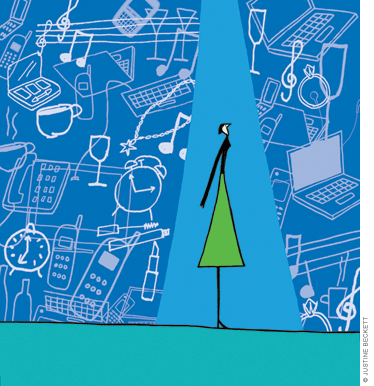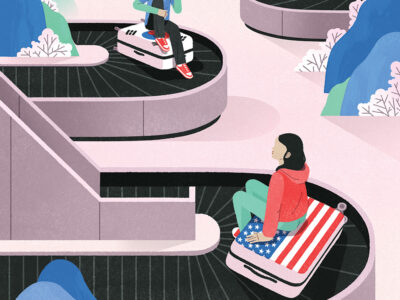
At first glance, not much about religious-studies professor Justin McDaniel screams “monk.”
At five o’clock on a Wednesday afternoon, he’s racing to answer all his emails before he goes to pick up his son from daycare.
“So, I have a background in two areas. I studied Buddhism for a long, long time,” he says. “And I grew up as a pretty strict Catholic—oh, hold on.” He answers his cellphone. It’s his wife. “Sorry about that. Where were we?”
But McDaniel has a lot of experience with the ascetic lifestyle. He lived as a Buddhist monk in Laos and Thailand for a stint after college, and even went on a Jain pilgrimage in India. He drew upon those experiences this past spring semester to teach a course titled, “Living Deliberately: Monks, Saints, and the Contemplative Life.”
McDaniel’s course had no exams or papers. But it was hard work. To pass, students were required, at various points during the semester, to forgo music, technology, coffee, and physical contact with others. They had to wake up by 5 a.m.—without an alarm—and meditate several times a day. The restrictions were based on the practices of various monastic orders around the world.
“It’s not like any of them have a special purpose,” one of McDaniel’s students, Wharton sophomore Max Kieff, explains. It’s more about being mindful of every action. “If you’re willing to exert self-control in the moment, you definitely reap rewards,” he says.
Ninety-six students initially applied to the course, but when McDaniel interviewed candidates, he says, “most dropped out immediately.” In the end, 17 students made the cut.
For those brave few, the constraints started small. At first, restrictions only applied during class. Men and women sat on opposite sides of the classroom, and there was a dress code: white shirts for the men, black shirts for women, and no make-up, jewelry, or hair products. And, of course, no laptops were allowed; students had to take notes with a pen and paper.
The restrictions outside of class gradually increased. Students had to give up caffeine and alcohol one week, TV and music another. But the true challenge was one month of heavy restrictions that began in mid-March. Students had to take a complete vow of silence, forgo electronics, cook all their food from scratch, and manage on a budget of less than $50 a week. For that month, no sexual activity of any kind was permitted. In fact, any physical contact with others was forbidden; students even had to avoid looking people in the eye for more than five seconds. The only way students were able to communicate with friends and family was by writing letters, the old-fashioned way.
Of course, students still attended all their classes as usual, but in some cases they had to talk to their professors beforehand to discuss how the restrictions would affect their participation. For Kieff’s ethics course, instead of vocally participating in discussions, he wrote down his responses and submitted them at the end of every class session. For other courses, it was a simple matter of searching the encyclopedia instead of Wikipedia before writing a paper. (McDaniel graded students in his class based on “their ability to abide by the rules” as well as class participation, daily journal entries, and a research presentation.)
Aelita Parker, a junior psychology major, says that time was her biggest concern. She worked 20 hours a week on top of taking six courses. “Meditation would take up time,” she says. So would cooking from scratch and doing homework without a computer. But she preempted her worries by finishing most of her bigger assignments over spring break, before the major restrictions took effect.
Different students had trouble with different restrictions. Kieff says he didn’t have too much trouble with the silence, the sleep schedule, or even time-management. But “not eating processed sugar and stuff is really hard,” he recalls. “It’s just a constant temptation.”
He kept up his caloric intake by stockpiling his freezer with beef. But McDaniel had forbidden spices and condiments. “Steaks aren’t even that good when you boil them in water,”Kieff says.
And yet, “I was the happiest I had ever been in my life.” When he was stressed, he would meditate the worries away. “A lot of the annoyances—like misplacing your keys or something, or forgetting an assignment—those all disappeared,” he says. “I literally couldn’t have a bad day.”
This sort of revelation was part of McDaniel’s master plan all along.
“It’s all designed to create a hyper sense of awareness,” he says. One main goal of the class was to try to understand why so many different religions practice similar types of constraints.
“Why deny yourself for this eventual paradise? I don’t think I’m going to figure it out,” he says. But part of what the students are figuring out is whether there’s a “here and now” benefit to asceticism.
For Parker, the benefit of intense introspection, ironically, was that she was able to better communicate and connect with people.
“Loneliness can be very productive,” she says. “That’s when you’re learning. That’s when you’re reaching out to people in a very real sense.” Now that she’s done with the course, Parker says, “There isn’t a second of silence that’s not real to me.” She doesn’t check her email or cellphone as often. “Things like Facebook and things like Gmail, they can be stressful.”
And nowadays, when she talks to people, Parker tries not to focus so much on how she’s going to impress them, or what she’s going to say next.
“The class made me realize, in my silence, that I would rather be authentic and quiet and have a real conversation,” she says. “It taught me about authentic conversation, authentic relationships.”
The restrictions were a road to revelation, Parker concludes. “You’re forced to explore yourself. That’s something people really need. Especially in college, because that’s the prime time when you’re learning about yourself.”
—Maanvi Singh C’13




